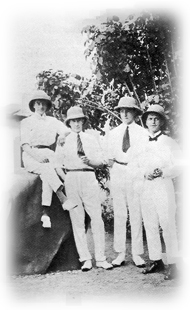|
|
"The greatest mistake was to expect an average colony to support itself. But, when one considers colonial rule one has got to remember what was there before it started. Cannibalism, slavery, human sacrifice and various other abominations all existed in Nigeria and the Gold Coast. So I'm quite certain that colonialism was a good thing from the point of view of the African native himself. It taught him respect for the law, it removed him from the constant fear of witchcraft and it taught him also that you could have a democratic government instead of the absolute rule of chiefs" British Administrator posted to Africa
| |
This is part of a trilogy of oral history books taken from the statements of people who really did live and work in part of the imperial framework of this continent. It is a great collection of interesting and amusing anecdotes that really go to the core of the imperial experience, or at least those who did the administering. If you understand the limits of the sources and the reliability of oral history, you can get a lot from this book. It is fluid, well written and quite witty in places. More than this, it tends to cast shadows and interesting snippets of history that tend to be missed by the modern historian writing retrospectively about the era: A small line such as the quote from a Sudanese man 'Why are the Turks so rude and why do they smell bad' can give you far more information than is realised. First of all, it makes you realise that the for the local population, one imperial overlord blended into another. Secondly, it illustrates how they perceived the manner and conduct of the British. Lastly, it tells you how the difference in diet really did make itself obvious to the locals. All of this from just one relatively unimportant quote.

|
Almost as important as the gleaning of new information is the fact that these witnesses confirm more established ideas and preconceptions of the ruling class in Africa. One administrator relates how he was told by his superior to: 'keep them in their place - and their place was obviously below!'. But, you do get to see how not all ideas and practices weren't quite so unpleasant. Lord Lugard's ideas concerning indirect rule and dual government sound positively progressive: 'Our policy was always to leave as much as possible to the people themselves and not to interfere with their lives' ...Unfortunately, the paternalistic attitude of the colonials wouldn't always desert them... 'unless it was obvious that what they were doing was wrong.' However, it is the ability to be able to see the world through the eyes of these administrators that make this book worth reading. You get to see that they learnt the local languages because they would get an automatic increase in pay, or that they would be continuously preoccupied with their low level of pay and conditions, that trying to defend themselves from the local insects and reptiles would be their main concern in day to day life. In short, they come across as all too human with all of the vices and virtues that you'd expect to find anywhere. They are less the stereotype than just doing their best in what were all too often highly uncomfortable conditions.

|
Given that this is an oral history, it obviously tells the story of the winding up of the colonial enterprise in far more detail than its creation and inception. This is just because of the simple mathematics behind how long people live. There are many survivors from the end of imperial rule, relatively few from the middle and almost none from the beginning. This end of an era feeling reveals itself when you read how the administrators all thought that they would have jobs for far longer than they actually did. You can see how the imperialists transformed themselves into development specialists and then into anachronisms as the continent hurtled into independence at breakneck speed. Each administrator had their personal revelation of their own irrelevancy in their own individual ways: by witnessing violence or hostility against them, by realising that their African underlings were as capable (if not more so) at administering the local population than they were themselves, or that they had realised that, deep down, they had realised that they were anachronisms all along. I found one quote to be quite revealing when it tells of how the post-war generation of British administrators differed from the older generation by turning away from the traditional heirarchy of African leaders to the new educated, business and political elite. This probably caused just as many problems at dealing with the more established leaders than if they had maintained the older loyalties. But, it does give an insight into what process was going on at the time of decolonisation and it may help to explain why there have been so many problems in these colonies since they achieved independence, as artificially created elites have striven to maintain the power and influence that they managed to inherit as Britain left the colonies to their own fates.
The book is part of a series; joining one on South East Asia and one on India. I do recommend it as an interesting and fascinating history, but one with a particular angle and with some limitations.
| |

